Stay in the know on all smart updates of your favorite topics.
Modular Construction
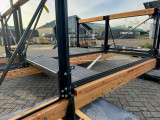
During this Meetup we will discuss how modular construction with wood and steel transforms traditional construction practices and opens new doors for efficiency, sustainability and creativity. The project team of the project “Modular and c
Circular Bridge Systems” will show the results of this project and would like to discuss the challenges that modular construction brings with it in the areas of creativity versus standardization, digitalization, circular materials and new business models.
Modular and industrial construction is an umbrella term for innovative construction methods that promote efficiency and sustainability. In modular construction, structures are built from prefabricated modules or components that are produced in a factory and then assembled on the construction site. This speeds up construction time and minimizes waste. Industrial construction focuses on advanced manufacturing technologies and standardized processes to improve quality and efficiency, while also offering flexibility in design. Both approaches contribute to cost savings, reduced environmental impact and faster project delivery in the construction sector.
The project team that will give the presentation consists of:
Thijs Asselbergs - Thijs Asselbergs Architectuurcentrale
Arjan Karssen - Bureau Arjan Karssen
Anke Rolvink - Packhunt
Jasper Dol - 3D Makers Zone (3DMZ)
Mark Feijen - Isaac
Chris Aerts - AplusV
Annette Beerepoot - BouwLab R&Do
16:00 - 18:00 | BouwLab - Oudeweg 91-96, Haarlem
Modular Construction
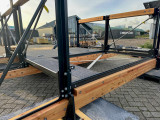
During this Meetup we will discuss how modular construction with wood and steel transforms traditional construction practices and opens new doors for efficiency, sustainability and creativity. The project team of the project “Modular and c
Circular Bridge Systems” will show the results of this project and would like to discuss the challenges that modular construction brings with it in the areas of creativity versus standardization, digitalization, circular materials and new business models.
Modular and industrial construction is an umbrella term for innovative construction methods that promote efficiency and sustainability. In modular construction, structures are built from prefabricated modules or components that are produced in a factory and then assembled on the construction site. This speeds up construction time and minimizes waste. Industrial construction focuses on advanced manufacturing technologies and standardized processes to improve quality and efficiency, while also offering flexibility in design. Both approaches contribute to cost savings, reduced environmental impact and faster project delivery in the construction sector.
The project team that will give the presentation consists of:
Thijs Asselbergs - Thijs Asselbergs Architectuurcentrale
Arjan Karssen - Bureau Arjan Karssen
Anke Rolvink - Packhunt
Jasper Dol - 3D Makers Zone (3DMZ)
Mark Feijen - Isaac
Chris Aerts - AplusV
Annette Beerepoot - BouwLab R&Do
Lecture & workshop: BioCommons
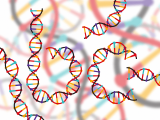
Waag lecture and workshop: BioCommons
In the BioCommons project, Waag investigates how we can combine and use our genetic data, while managing them as a community.
Free entrance | Register here
Join us for a thought-provoking event that puts you at the forefront of genomic research and health decision-making. Have you ever wondered how your DNA can contribute to medical research and improve your healthcare journey?
We invite you to explore this exciting frontier at our workshop: it is you who can decide what type of research questions can be formulated about your genetic information.
The evening will start with an introduction to BioCommons by Waag's Lucas Evers, followed by a keynote of professor Karien Stronks on The Helius study, insights in the biological, psychological and social causes of the unequal burden of disease across ethnic groups in Amsterdam. After this, a hands-on workshop follows for you to participate in.
In this workshop you will be able to:
- Discover what kind of research you would like to see conducted with your DNA. Explore how patient-centered genomic services can empower you to shape the future of medical investigations.
- You will delve into the importance of genetic literacy and informed consent. Understand how individuals can make informed decisions regarding the use of their genetic data in research and healthcare.
- Learn about Waag's BioCommons project and learn about its latest findings. Our experts will provide brief interventions and mediate discussions to help you understand the impact of genetic information as a common good.
- Enhanced Decision-Making: Consider how an improved approach to direct consumer testing, which is more inclusive and diverse, can grant individuals more control over their genetic and non-genetic health-data. We will explore how this new data management paradigm influences your behaviour and health.
- Cultural and Ethical Aspects: Reflect on the intricate connections between culture, identity, ethnicity, and genetics. Discuss the implications and potential benefits of a patient-centered approach to genetics.
Programme
19:00-19:15 hrs - Welcome
19:15-19:30 hrs - Introduction to BioCommons by Lucas Evers
19:30- 19:55 hrs - Keynote by Karien Stronks: The Helius study, insights in the biological, psychological and social causes of the unequal burden of disease across ethnic groups in Amsterdam
19:55-20:45 hrs - Workshop
20:45 to 21:00 hrs - Conclusion
Free entrance | Register here
Just.City.2023

KOM NAAR JUST.CITY.AMSTERDAM.2023
Amsterdam is al 750 jaar in beweging. De ontwikkelingen van de afgelopen jaren maken het een stad waarin niet voor iedereen plek is. Basisvoorzieningen zoals wonen, onderwijs, zorg, voedsel, de publieke ruimte en een leefbaar klimaat staan bijvoorbeeld steeds meer onder druk. We merken allemaal dat er zaken niet rechtvaardig zijn en daar willen wij, samen met jou, verandering in brengen.
Vanaf 16 november voert het Centre of Expertise Urban Governance and Social Innovation daarom officieel de naam Centre of Expertise Rechtvaardige Stad. Op die datum organiseren wij als lancering Just.City.Amsterdam.2023; een middag vol workshops, lezingen, gesprekken en persoonlijke ontmoetingen. Tijdens deze middag in Ru Paré Community willen we elkaar inspireren en aanzetten tot manieren om naar een rechtvaardige stad te kijken en er samen aan te werken. Jij bent van harte welkom!
We hebben schrijvers, dichters, onderzoekers, ondernemers, studenten, bestuurders en buurtorganisaties uit de stad gevraagd om een bijdrage te leveren aan ons programma. Met onder andere: Gökhan Aksoy, Abdelkader Benali, Joris Lechêne, Ria Braaf-Fränkel, Lucia Kula, Roberto Rocco, Arnt Mein.
Via onderstaande knop vind je meer informatie over de lancering en het aanmelden.
Technologies that allow for looking underground without digging
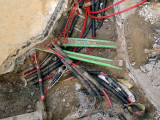
The ground is full of cables, pipes, and other assets but we don’t always know exactly where they are located. Digging is the most common practice to look for assets, however, this has many negative impacts. It can lead to damage to assets, it costs time and money to dig, and it is often an inconvenience to the direct surroundings.
Therefore, it would be extremely convenient if we could find methods to locate assets without having to dig. We are looking for start-ups, research groups, and knowledge institutions that have developed or can develop a technology that can scan, detect, or sense, underground assets without digging.
Are you the person we are looking for, or do you know the person or organisation we are looking for? Please let us know by sending a message to noor@amsterdamsmartcity.com or leaving a comment below.
Demoday #21: How to share the learnings of Local Energy Systems and form a coalition
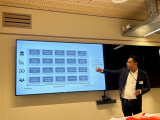
When thinking about the decarbonization of cities, Local Energy Systems (LES) are often mentioned as one of the key enablers in the future. While there is agreement that LES have a role to play in the energy system of the future, what exactly is this role and how do we scale up implementation of this solution?
Cities are a major source of GHG emissions, with UN estimates suggesting that cities are responsible for ~75% of global emissions, mainly by means of transport and energy use in buildings. The decarbonization of buildings within urban areas can prove especially difficult, as space is limited, issues like grid congestion delay further electrification and there are a lot of stakeholders involved.
LES can be a solution in the decarbonisation of buildings in urban areas, like residential spaces, business parks and hybrid areas, creating positive energy districts that simultaneously reduce their impact on the grid. Preliminary LES pilot programs indicate that a LES can support decarbonization by integrating renewable generation and efficiently using energy by decreasing energy losses due to smart grids, communal energy management systems and by combining generation and use as locally as possible. We are however still in the early stages of building and growing LES around the globe, which is why we are focused on getting the right stakeholders together and learning about the requirements for scaling up such systems.
## Case & Set-up of the Session
During the latest Transition Day we hosted a work session on the topic of LES. In the past months, a number of partners in the Amsterdam Smart City network have expressed interest in the topic and would like to work together on the topic. Simultaneously the HvA, who is working on the ATELIER project with the aim to create Positive Energy Districts (PEDs), developed a framework to structurally categorize the various aspects involved in implemeting a LES. During the Demo Day, we considered two topics related to LES The first was a the framework created by the HvA, with the intention of capturing feedback and validating the approach. Secondly, we considered how we can move from an informal network around LES, to a structural coalition that can scale up the concept.
## Insights
A framework for structurally capturing aspects of a LES
Omar Shafqat from the HvA / ATELIer project presented their framework for structurally capturing and monitoring aspects of LES. The framework categorizes various aspects into policy, market, technical and social considerations (from top to bottom). Next to that, it divides these aspects on a timeline along a planning horizon from longer term (planning) to shorter term (management). The framework is shown below in this image.
In response to the framework, the participants shared some the following feedback:
- Testing the framework is necessary to validate and improve it. This implies an inventorization of LES projects and working through a few specific cases to check how the framework can be applied, and how it can benefit project managers/owners.
- The framework should also be presented and validated by other key stakeholders such as Amsterdam’s “Task Force Congestion Management”.
- Participants raised the question of who exactly will use the framework, and how? Is this intended as an instrument to be used primarily by academics, and researchers, or also by practitioners?
Forming a coalition on the advancement of LES
The second part of the work session was moderated by Joost Schouten from Royal Haskoning DHV, who led the discussion on the need for building a coalition around LES. He argued that the further development of LES requires an ecosystem approach, since multiple parties with different interests are involved, but there is no clear ‘owner’ of the problem.
A ‘coalition of the willing’ could help to advance the development of LES. A discussion in breakouts led to the following insights:
- A coalition should be formed by the community itself, but it requires a party that coordinates during the kick-off phase. A discussion emerged around whose role should be to take on the coordination phase. Some participants were of the view that this should be led by a governmental party, others thought this should be organised by a network party like Amsterdam Smart City.
- To effectively build a coalition, the involved parties need to be interdependent. To make sure that it is clear that the parties in a LES are interdependent, the parties need to state their interests in developing a LES, to determine whether there is a common goal.
- Even when these interests are not fully aligned, communication between parties can help bridge gaps. Discussion leads to understanding and empathy.
- An ambassador can be a vital enabler in the beginning of building a coalition, as a clear face and point of contact for such a group.
- There are already many other communities and coalitions working on topics related to LES, including but not limited to 02025, New Amsterdam Climate platform, TET-ORAM, TopSector Energie, among others. A key question is whether a new coalition is necessary, or whether it should be possible to join forces with an existing coalition / initiative.
## Conclusions and next steps
Many work session participants indicated support and interest to further contribute to the development of the LES project. The HvA framework was viewed as a useful tool to capture learnings from LES projects to facilitate scaling up. Additionally, the question of how to facilitate collaboration and coalition forming requires further attention. There are many parties involved in the development of LES, and they don’t always have the same interests. However, this is not an issue that any party can ‘own’ or ‘solve’ on its own. It requires an ecosystem approach, which is something that will need to be further detailed.
For now, we will simultaneously work on further building the coalition and looking for LES projects that can be used to test and further develop the framework. If you would like to know more or get involved in the project, for example by contributing you own LES to be tested by the framework itself, let me know via noor@amsterdamsmartycity.com.
This challenge was introduced in the Amsterdam Smart City network by Lennart Zwols from gemeente Amsterdam and Omar Shafqat (HvA). The session was prepared with and moderated by Joost Schouten from Royal HaskoningDHV. Do you have any questions or input for us? Contact me via noor@amsterdamsmartcity.com or leave a comment below. Would you like to know more about the LES challenge? You can find the overview of the challenge with the reports of all the sessions here.
Kom 10 november naar de FoodCLIC visie workshop: Samen de route uitstippelen naar een gezonde, duurzame en toegankelijke voedselomgeving voor iedereen in de MRA.

FoodCLIC is een Europees onderzoeksproject waarin onderzoek gedaan wordt naar voedselsysteemtransformatie in stadsregio's. Het project richt zich op de plekken waar productie en consumptie samen komen, oftewel de voedselomgeving van de Metropool Regio Amsterdam. Voedsel Verbindt is als een van de praktijk partners aangesloten bij dit project en wilt daarom graag ook jouw stem vertegenwoordigd hebben binnen het onderzoek. Samen met de Vrije Universiteit, Food Council MRA en de Gemeente Amsterdam werken we samen om tot mooie inzichten te komen.
FoodCLIC kenmerkt zich doordat we ons bezig gaan houden met actie-onderzoek. In de vorm van real-life interventies. Voor verandering moeten we namelijk gewoon iets gaan doen, op zoek naar de oplossingen dus!
Datum en tijd:
vrijdag 10 november van 09.30 tot 16.30 (borrel tot 17.30 uur. )
Inclusief lokale lunch.
De locatie is:
Cultureel centrum NoLIMIT, Geldershoofd 80, 1103 BG, Amsterdam
Programma
09:30: Inloop & registratie
09:45: Start van de bijeenkomst
10:30: Workshop 1 - Regionale visie op de voedselomgeving in 2050
12:00: Voedseltours door de wijk
12:30: Pauze (Lunch) - Lokale voedselinitiatieven op je bord
13:30: Workshop 2 - Het voedselsysteem begrijpen
15:00: Pauze
15:30: Workshop 3 - Uitkomsten en doelstellingen formuleren
16:30: Borrel
Registreer jezelf via de onderstaande link:
Voel je vrij om contact op te nemen via ruben.smolders@voedselverbindt.nl
Amsterdam Donut Dag
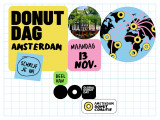
Groter dan ooit: Amsterdam Donut Dag 13 november - schrijf je nu in!**
De langverwachte Amsterdam Donut Dag staat bijna voor de deur! Op 13 november duiken we in de wereld van de Donut Economie en laten we zien hoe de gezamenlijke inspanning van pioniers Amsterdam tegen 2025 dichter bij de Donut brengt.
Dit jaar is extra bijzonder, want het markeert de allereerste Wereldwijde Donut Dag onder het motto 'Lokale Actie, Mondiale Connectie.' Wereldwijd organiseren meer dan 30 groepen en netwerken lokale Donut Festivals!
Verspreid over Amsterdam vinden op maandag 13 november in totaal 15 Donut-sessies plaats. Hier laten we samen zien dat de Donut Economie geen theoretisch model is, maar een praktische benadering. Verwacht geen vage beloftes, maar concrete voorbeelden van initiatieven binnen de stad, zowel groot als klein.
's Avonds komen we samen in Pakhuis de Zwijger om samen met pioniers en elkaar te dromen en te visualiseren hoe Amsterdam eruit zou kunnen zien in 2025. Mis deze geweldige kans niet! Ben jij erbij?
16. A pleasant (family) home

This is the 16th episode of a series 25 building blocks to create better streets, neighbourhoods, and cities. This post is about one of the most important contributions to the quality of the living environment, a pleasant (family)home.
It is generally assumed that parents with children prefer a single-family home. New construction of this kind of dwelling units in urban areas will be limited due to the scarcity of land. Moreover, there are potentially enough ground-access homes in the Netherlands. Hundreds of thousands have been built in recent decades, while families with children, for whom this type of housing was intended, only use 25% of the available housing stock. In addition, many ground-access homes will become available in the coming years, if the elderly can move on to more suitable housing.
The stacked house of your dreams
It is expected that urban buildings will mainly be built in stacks. Stacked living in higher densities than is currently the case can contribute to the preservation of green space and create economic support for facilities at neighbourhood level. In view of the differing wishes of those who will be using stacked housing, a wide variation of the range is necessary. The main question that arises is what does a stacked house look like that is also attractive for families with children?
Area developer BPD (Bouwfonds Property Development) studied the housing needs of urban families based on desk research, surveys and group discussions with parents and children who already live in the city and formulated guidelines for the design of 'child-friendly' homes based on this.
Another source of ideas for attractive stacked construction was the competition to design the most child-friendly apartment in Rotterdam. The winning design would be realized. An analysis of the entries shows that flexible floor plans stand head and shoulders above other wishes. This wish was mentioned no less than 104×. Other remarkably common wishes are collective outdoor space [68×], each child their own place/play area [55×], bicycle shed [43×], roof garden [40×], vertical street [28×], peace and privacy [27× ], extra storage space [26×], excess [22×] and a spacious entrance [17×].
Flexible layout
One of the most expressed wishes is a flexible layout. Family circumstances change regularly and then residents want to be able to 'translate' to the layout without having to move. That is why a fixed 'wet unit' is often provided and wall and door systems as well as floor coverings are movable. It even happens that non-load-bearing partition walls between apartments can be moved.
Phased transition from public to private space
One of the objections to stacked living is the presence of anonymous spaces, such as galleries, stairwells, storerooms, and elevators. Sometimes children use these as a play area for lack of anything better. To put an end to this kind of no man's land, clusters of 10 – 15 residential units with a shared stairwell are created. This solution appeals to what Oscar Newman calls a defensible space, which mainly concerns social control, surveillance, territoriality, image, management, and sense of ownership. These 'neighborhoods' then form a transition zone between the own apartment, the rest of the building and the outside world, in which the residents feel familiar. Adults indicate that the use of shared cars should also be organized in these types of clusters.
Variation
Once, as the housing market becomes less overburdened, home seekers will have more options. These relate to the nature of the house (ground floor or stacked) and - related thereto - the price, the location (central or more peripheral) and the nature of the apartment itself. But also, on the presence of communal facilities in general and for children in particular.
Many families with children prefer that their neighbors are in the same phase of life and that the children are of a similar age. In addition, they prefer an apartment on the ground floor or lower floors that preferably consists of two floors.
Communal facilities
Communal facilities vary in nature and size. Such facilities contain much more than a stairwell, lift and bicycle storage. This includes washing and drying rooms, hobby rooms, opportunities for indoor and outdoor play, including a football cage on the roof and inner gardens. Houses intended for cohousing will also have a communal lounge area and even a catering facility.
However, the communal facilities lead to a considerable increase in costs. That is why motivated resident groups are looking for other solutions.
Building collectively or cooperatively
The need for new buildings will increasingly be met by cooperative or collective construction. Many municipalities encourage this, but these are complicated processes, the result of which is usually a home that better meets the needs at a relatively low price and where people have got to know the co-residents well in advance.
With cooperative construction, the intended residents own the entire building and rent a housing unit, which also makes this form of housing accessible to lower incomes. With collective building, there is an association of owners, and everyone owns their own apartment.
Indoor and outdoor space for each residential unit
Apartments must have sufficient indoor and outdoor space. The size of the interior space will differ depending on price, location and need and the nature of the shared facilities. If the latter are limited, it is usually assumed that 40 - 60 m2 for a single-person household, 60 - 100 m2 for two persons and 80 - 120 m2 for a three-person household. For each resident more about 15 to 20 m2 extra. Children over 8 have their own space. In addition, more and more requirements are being set for the presence, size, and safety of a balcony, preferably (partly) covered. The smallest children must be able to play there, and the family must be able to use it as a dining area. There must also be some protection against the wind.
Residents of family apartments also want their apartment to have a spacious hall, which can also be used as a play area, plenty of storage space and good sound insulation.
'The Babylon' in Rotterdam
De Babel is the winning entry of the competition mentioned before to design the ideal family-friendly stacked home (see title image). The building contains 24 family homes. All apartments are connected on the outside by stairs and wide galleries. As a result, there are opportunities for meeting and playing on all floors. The building is a kind of box construction that tapers from wide to narrow. The resulting terraces are a combination of communal and private spaces. Due to the stacked design, each house has its own shape and layout. The living areas vary between approximately 80 m2 and 155 m2 and a penthouse of 190 m2. Dimensions and layouts of the houses are flexible. Prices range from €400,000 – €1,145,000 including a parking space (price level 2021).
As promised, the building has now been completed, albeit in a considerably 'skimmed-down' form compared to the 'playful' design (left), no doubt for cost reasons. The enclosed stairs that were originally planned have been replaced by external steel structures that will not please everyone. Anyway, it is an attractive edifice.
13. Social safety

This is the 13th episode of a series 25 building blocks to create better streets, neighbourhoods, and cities. This post discusses the way cities can secure public space, distinguishing symptom control and a more fundamental approach.
Scope of crime
According to the World Health Organization, the risk of being confronted with physical violence significantly detracts from the quality of life. In 2000, homicides worldwide resulted in half a million deaths, nearly twice the number of people who died in a war that year, but less than 40% of fatalities on roads. Many murders are related to drug trafficking. The number of murders in the European Union that year was about 5200. Between 2008 and 2016, car thefts dropped by 36% and robberies by 24%. Both trends leveled off after 2010. However, police-recorded sexual violence in the EU shows an increase of 26% between 2013 and 2016.
Monitoring
Social safety is a precondition for the viability of public space. This applies to who works there, who lives there and who visits it. Frequently chosen solutions are the installation of cameras. Not bad, although streets without cameras run the risk of becoming less safe. Moreover, miscreants know well how to disguise their identity.
In Stratumseind, the illustrious nightlife center of Eindhoven, extensive experiments with CCTV cameras and sensors and, in addition, atmospheric lighting and scents have been executed (photo below right researcher Rinus Kanters in the control room). The city regards this experiment as a 'living lab' and it has continuously been evaluated. The results so far are that no clear connection has been found between this technology and the number of incidents, the feeling of safety among visitors has increased and the police are more quickly on the scene in the event of incidents.
Intensive use
Further conditions are intensive use. The more people on the street, the greater the social security, except for theft. Also 'eyes on the street', apartments in the space above the plinths help. More generally, transparency is of value. Transparent plinths of apartment buildings contribute to it (photo left: the Kleiburgflat, Amsterdam)
Lighting
Lighting is an important issue. It is not even so much about the fierceness of it, which entails other objections, but about the uniformity (photo above right). A particularly wrong idea is to equip lights with motion sensors, so that they only come on when a passer-by approaches. This is at the expense of the ability to keep an overview. There is no objection to slightly dimming the lighting when streets are less busy.
A decent existence
The ultimate policy to reduce crime and improve security is:
• Providing training, guidance and 'social employment', such as the 'Melkert jobs' from the 1990s, to bridge the distance to the labor market.
• Creating guaranteed jobs in the public sector for all. Not only to improve the quality of life of the unemployed, but also to perform numerous tasks that are currently left undone.
• Allocating a decent income to all adults, as long as paid work still falls short. Experiments with basic income show that this increases resilience, self-confidence and the chance of paid work.
• Providing temporary professional (psychological) assistance and guidance with household, and financial management and training on the way to full integration in society.
• The more intensively residents of a neighborhood interact with each other and keep an eye on each other's possessions, the less crime will have a chance. Social control has always been a powerful weapon against crime.
• In anticipation of permanent housing, shelter the homeless to prevent drug-related crimes and give high priority to combating violence and burglary.
It would be naive to think that less inequality and improvements in income, jobs and housing for the poorest groups will eliminate crime altogether. Greed, thrill-seeking, boredom, membership in wrong groups, wrong connections, imitation, mental illness, and alcohol and drugs abuse are not necessarily related to poverty and require judicial action.
Effective prevention and policing
• protection against the relatively small group of repeat-offenders, who are responsible for most crimes, especially violent crimes.
• Close cooperation between residents and the police at neighborhood level
• Police presence on bicycles (better than in cars),
• Detailed knowledge of the police and judiciary of and communication with youth groups that incidentally causes problems
• Sensible and proportionate use of digital resources to track down criminals.
Follow the link below to find an overview of all articles.
🍃 Join us for the next gathering of Climate Tech Amsterdam on October 17 at TNW City.

<strong>🍃 Join us for the next gathering of Climate Tech Amsterdam on October 17 at TNW City.</strong>
An initiative backed by leading ecosystem players, including TNW, StartupAmsterdam, Carbon Equity, Google Netherlands and supported by Climate Tech Cities and De Roos
💡 For this edition, we'll uncover the latest trends & developments in (Dutch) Climate Tech and facilitate discussions around e.g. Sustainable AI and Closing the Climate Finance Gap.
Climate Tech Amsterdam is the Netherlands’ leading community of climate tech innovators, experts and enthusiasts gathering during meetups, roundtables and events to exchange best practices, discuss challenges and opportunities and showcase success stories within Climate Tech.
Spots are limited, so make sure to register!
AMS Conference 2024: Call for abstracts and special sessions

We invite you to contribute to the conference "Reinventing the City 2024 - Blueprints for messy cities?"
Deadline to submissions: November 14, 2023
Notification of acceptance: December 14, 2023
submit here>>
The AMS Scientific Conference (AMS Conference) explores and discusses how cities can transform themselves to become more livable, resilient and sustainable while offering economic stability. In the second edition of “Reinventing the City” (23-25 April 2024), the overarching theme will be <em>"</em>Blueprints for messy cities? Navigating the interplay of order and complexity'. In three captivating days, we will explore 'The good, the bad, and the ugly' (day 1), 'Amazing discoveries' (day 2) and 'We are the city' (day 3).
Call for abstracts
The AMS Conference seeks to engage scientists, policymakers, students, industry partners, and everyone working with and on cities from different backgrounds and areas of expertise. We therefore invite you to submit your scientific paper abstract, idea for a workshop or special session with us. Submissions should be dedicated to exploring the theme ‘Blueprints for messy cities?’. We especially invite young, urban rebels to raise their voice, as they are the inhabitants of our future cities.
Assessment
Our scientific committee responsible for the content of the conference program will assess all submissions and select a final program of contributions. Notification of acceptance will follow before 1 December 2023.
Topics
mobility | circularity | energy transition | climate adaptation | urban food systems | digitization | diversity | inclusion | living labs | transdisciplinary research
SUBMISSIONS AND CONTRIBUTIONS
| SCIENTIFIC PAPER ABSTRACTS |
We invite academics, industry partners, and professionals from all ages engaged in the related fields of urban design, governance, architecture, data science, engineering and/or sociology to submit an abstract for a conference presentation of your scientific paper (250-450 words).
| WORKSHOPS |
If you have a workshop proposal, please outline its purpose, the specific knowledge, techniques, or practices it covers, its objectives and learning outcomes, teaching strategies and resources, target audience, and any prerequisites, including the required level of experience (250-450 words).
| SPECIAL SESSIONS |
Next to scientific papers and workshops, we encourage you to submit different types of special sessions. These special sessions can include interactive forums, excursions, or practical demonstrations, depending on the subject and objectives. When submitting your proposal for a special session, we ask you to clearly highlight the session's objectives, expected collaborators (if applicable), the intended audience, and the type of session. Please also indicate whether you prefer an online or in-person format. Please note that you will be responsible for the content and organization of the session (250-450 words).
Click here to visit the event page and find more information on details about the Scientific Conference.
Hoe creëer je Levende Lerende Netwerken die impact hebben?
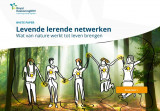
Hoe maak je de stap van gezamenlijk leren, naar samen echt dingen doen? Er is al veel over gezegd en geschreven... Communities of practice, smeden van allianties, enz enz... Vaak blijft het dan een beetje hangen bij het organiseren van een toffe sessie, vast met veel energie. En daarna gaat iedereen - als het goed is met nieuwe ideeën en inspiratie - weer verder met waar 'ie al mee bezig was. Vaak is dat al genoeg, maar zeker in transities wil je eigenlijk een stapje verder komen.
Is eigenlijk al wel voldaan aan een aantal belangrijke condities om het netwerk levend te maken en te houden?
Reflecterend op onze eigen praktijk, ontdekten we een aantal kenmerken die belangrijk en beïnvloedbaar zijn bij het bouwen van impactvolle levende lerende netwerken. Amsterdam Smart City zelf is zo'n voorbeeld, waarin we voortdurend met elkaar op zoek zijn naar hoe we onze samenwerking van betekenis kunnen laten zijn voor de duurzame transities in onze regio. De Green Deal Circular Festivals, het MRA Platform Smart Mobility, Sail Amsterdam, en het Initiatief Bewust Bodemgebruik zijn enkele andere voorbeelden van levende lerende netwerken. Ook hier zagen we telkens dat de volgende kenmerken van belang zijn om verder te komen, en om de stap te maken van samen leren, naar samen doen:
(1) Wederzijdse afhankelijkheid tussen deelnemers
(2) Beweging door gedeelde energie
(3) Diversiteit daagt uit
(4) Persoonlijke ontwikkeling, empathie, ego overstijgend
(5) Veilige ruimte om te leren en ontwikkelen
Op basis van onze ervaringen in de praktijk, hebben we onze kijk op het ontstaan, de kenmerken en het begeleiden van Levende Lerende Netwerken opgeschreven in een whitepaper. Wil je meer weten, dan kun je die downloaden via onderstaande link (naar beneden scrollen naar de download knop van de Levende Lerende Netwerken Whitepaper).
Tijdens het PGM Open Congres op 26 september organiseren we hierover een workshop voor programmamanagers (https://lnkd.in/gcRPv4V8). En, je kunt me natuurlijk altijd een berichtje sturen als je meer wilt weten!
What can Amsterdam learn from YIMBY Arnhem!
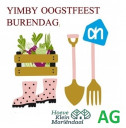
At the 22nd of September 2023 we celebrate the tenth YIMBY Harvest Festival at the Hoeve Klein Mariëndaal in Arnhem. What is YIMBY? YIMBY is the acronym for Yes-In-My-Back-Yard. YIMBY Arnhem! started in 2013 with the distribution of small scale food platforms, called YIMBY's, to the citizen of Arnhem. At the same time green education was offered to urban food growers to convert green enthusiasm into green harvest. During ten years hundreds of citizen in Arnhem joined the YIMBY social network of growing healthy, organic food in the city. The succes of YIMBY Arnhem! are the people supported by local government and local branches of green companies.
YIMBY is a culture of YES, positively stimulating social innovation for a healthier, greener and more social neighbourhood. The YIMBY experience demonstrates that changes do not start in The Hague, Brussels or Strasbourg. The change to a greener and more social Europe starts at home, in the backyard of people. We invited Frans Timmermans to the YIMBY Harvest Festival in Arnhem to share and to learn from ten years of YIMBY experience in the city of Arnhem. YIMBY Arnhem! shows that in due time small grassroots initiatives steadily grow and empower people to social inclusion and green cooperation.
Stagiair social media voor Amsterdam Donut Coalitie
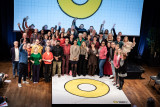
Ben jij gepassioneerd over A) de donuteconomie B) Amsterdam en C) heb je communicatie & sociale media skills? Dan zijn we op zoek naar jou en jij naar ons! De Amsterdam Donut Coalitie is namelijk op zoek naar een gedreven social media stagiair. Of je nu de voorkeur geeft aan een deeltijd- of voltijds stage, wij staan open voor beide opties. Bovendien bieden wij een maandelijkse vergoeding van 400 euro voor voltijd!
Dit is jouw kans om hands-on ervaring op te doen en direct impact te maken. Je zult in contact komen met pioniers en betrokken raken bij tal van inspirerende projecten en activiteiten in Amsterdam. Bovendien word je onderdeel van een ervaren team dat je begeleidt bij o.a. branding en vormgeving. Als kers op de taart krijg je de kans om bij te dragen aan het Donut Festival en internationale samenwerkingen!
Jouw verantwoordelijkheden omvatten onder andere:
- Het beheren van de contentkalender
- Twee keer per week posts plaatsen op LinkedIn en Instagram
- Het verzorgen van een maandelijkse nieuwsbrief
- Het verder ontwikkelen van onze LinkedIn- en Instagram-kanalen
- Het publiceren van nieuwsitems op onze website
- Het uitwerken van een promotiestrategie voor het jaarlijkse Donut Festival
We waarderen jouw eigen ideeën en inbreng en staan altijd open voor jouw suggesties!
Ben je geïnteresseerd? Stuur dan snel een e-mail naar Rosa Tibosch: connect@amsterdamdonutcoalitie.nl met een korte motivatie en je cv.
#AmsterdamDonutCoalitie #DonutEconomie #DonutAmsterdam #AmsterdamDonut #DoughnutEconomics #DoughnutEconomy #DEAL #Stage #Stagiair #Intern #SocialMedia
AMS Startup Booster 2023 - Call for applications is open until Oct 1st.
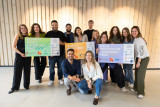
When:
Call for applications is open until Oct 1st. The program will last from mid-Oct 2023 until Feb 2024.
What:
The AMS Startup Booster is a business idea development and validation program hosted by AMS Institute, aiming to help aspiring entrepreneurs turn their gut feeling into a business. The entrepreneurs are expected to pursue an impact-driven startup in the field of urban tech.
Lasting over 3 months, the AMS Startup Booster 2023 will start on Oct 2023 and run until Feb 2024. The program will be mainly physical at the AMS Institute (Marineterrein, Amsterdam) and is most effective when all teams are fully committed so during the aforementioned time period there is a minimum requirement of 10 hours per week for each startup.
Program:
The curriculum consists of more than 30 workshops, masterclasses and 1on1s focusing on customer discovery and problem-solution fit.
During our workshops the following topics will be addressed:
- Market Research Fundamentals & Problem Definition
- Market Segmentation & Customer Personas
- Customer Discovery
- Value Proposition & Business Model Design
- MVP Design & Prototyping
- Experiment Design
- Pitching
In addition, our complimentary masterclasses will cover topics such as Team Fit & Alignment, Marketing & Branding, IP Rights, Finance & Funding, and many more.
Finally, peer-to-peer sessions and 1-on-1 mentoring by successful entrepreneurs and C-level professionals in your industry will complete the free services we offer to the selected startups. In total, the startups will get a 360 entrepreneurship curriculum consisting of more than 30 workshops & masterclasses.
Demo Day: Pitch and win prizes during the 'finals'
We close off the program with a Demo Day during which the teams showcase their business ideas and prototypes to a broad audience of experts, investors and entrepreneurs and compete for a list of amazing prizes! Prizes include:
- A 5000 euros feasibility grant for 1 team
- Guidance on the design of your feasibility experiment in the Marineterrein Living Lab
- Access to follow-up programs & funding opportunities
- Additional customer discovery sessions
- Continuous coaching & mentoring
- Office Space & Makerspace
- Promo material & access to a large network
In addition, connections with other programs and potential investors will be made.
For whom?
With batch #6 we're on the hunt for dynamic teams or individuals with a passion for tackling #urban_challenges head-on. It's the perfect platform for #students who've hatched a brilliant idea during their studies or #researchers eager to make a tangible, lasting impact with their work.
Registration
Apply for the AMS Startup Booster via this form. Applications should be submitted <strong>no later than Oct 1st</strong>.
Request: Seeking guidance and possible work opportunities in the smart city domain.
I am a mid-career Architect and, Urban and Regional Planner. I recently graduated with a second master's (MSc.) from IHS, Erasmus University Rotterdam, with a Specialization in "Infrastructure and Smart Cities". My MSc. thesis research topic was based on Circular Economy concepts including the Circular Business Model and High-value reuse of material and components.
I am very passionate about smart cities and sustainability, and I am highly inspired by all the work in the smart city area that is being done in the Netherlands, where I hope to contribute and make a positive impact.
Previously, in addition to planning and project management roles, I have worked in relevant areas of smart mobility, ICT Infrastructure, renewable energy, and waste to energy, among others as part of consulting firms.
I am looking for possible work opportunities in the Smart City area in the Netherlands. I will appreciate any reference, resource, and mentorship that could be offered to me.
Regards
Anoop Jha
Netherlands
GEMINI: Greening European Mobility through cascading innovation INItiatives
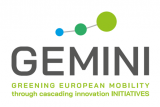
Context
At the heart of the GEMINI Project lies a commitment to fostering innovation and to accelerate the transition towards climate neutrality in mobility solutions.
Goal 11 of the UN Sustainable Development Goals advocates for access to safe, affordable, and sustainable transport systems. Nowadays, transport plays a significant role on air pollution and is one of the major sources of greenhouse gas emissions and is the only sector in the EU with increased Green House Gas (GHG) emissions compared to 1990.
The promotion of sustainable and innovative mobility solutions can help towards reducing GHG and carbon footprints, improving air quality, and achieving climate goals.
Project brief
The GEMINI Project (2023-2026 “Greening European Mobility through cascading innovation Initiatives” is a Horizon Europe funded project with 43 partners led by the Urban Electric Mobility Initiative (UEMI).
To accelerate the transition towards climate neutrality, GEMINI aims to foster widespread adoption of sustainable shared mobility solutions. To achieve this, the project will develop and test innovative business models for New Mobility Services (NMS) such as shared connected automated vehicles and shared mobility public transport through public-private partnerships. The NMS business models will be demonstrated in ten European Cities (Amsterdam, Copenhagen, Helsinki, Munich, Leuven, Ljubljana, Paris-Saclay, Porto and Turin).
Additionally, GEMINI will create digital tools and platforms that accommodate various mobility services, promoting collaboration and integration within the mobility sector. The project will actively engage stakeholders in the co-creation process, introducing Mobility as a Commons (MaaC) and incentivizing behavioural shifts and user acceptance of these new mobility options.
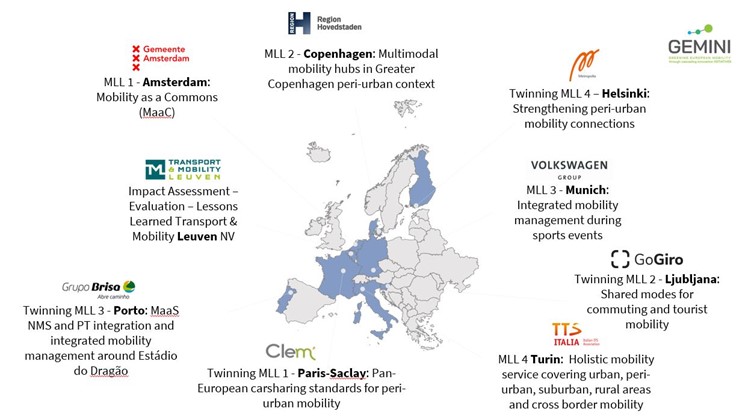
Furthermore, GEMINI will formulate policy recommendations to enable the scaling up and replication of successful mobility solutions. By aligning with Sustainable Urban Mobility Plans (SUMPs) and urban mobility planning frameworks, the project aims to contribute to a comprehensive policy package that guides and incentivizes future mobility innovations. The GEMINI project envisions fostering sustainable, accessible, and affordable shared mobility solutions that contribute to a safer and more environmentally friendly urban mobility landscape.
Objectives
- Develop and test sustainable business models for New Mobility Services (NMS) to increase shared mobility solutions (MaaS and MaaC) for various user groups, including enterprises, families, and tourists.
- Create digital enablers, including collaboration platforms and multimodal MaaS solutions, to integrate and facilitate a wide range of mobility services.
- Actively involve stakeholders in the co-creation of new mobility options and integrate Social Innovation practices to incentivize behavioural changes and user acceptance.
- Formulate policy recommendations to support the scaling up and replicability of successful mobility solutions, contributing to the development and implementation of SUMPs and urban mobility planning frameworks.
Cenex NL key contributions
The team plays a vital role in developing policy recommendations and technology roadmaps to accelerate the deployment of innovative mobility services. Through collaboration with local authorities in twinning cities, these roadmaps will align with the fast-track deployment of shared mobility trends in the short and medium term. Additionally, Cenex NL will contribute to the development of the Handbook consolidating the project’s learnings and offering practical guidance to cities and citizens across Europe.
This project has received funding from the European Union’s Horizon Europe research and innovation programme under grant agreement No 101103801.
Civity wint Green Innovation Hub Contest 2023
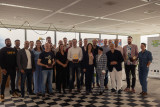
Almere, 6 juli 2023 – Civity is de winnaar van de Green Innovation Hub Contest 2023, waar verschillende start- en scale-ups hun innovatieve oplossing voor een duurzame en inclusieve leefomgeving presenteerden. Dat bepaalde de jury (UPAlmere!, Amsterdam Smart City, BTG, Future City Foundation, Floor Almere, Windesheim, Aeres, Provincie Flevoland, PRICE, Horizon en VodafoneZiggo) gisteren tijdens de Green Innovation Hub Contest tijdens een stormachtige dag. Na een succesvolle pitch won de start-up uit Amersfoort de Golden Award voor hun innovatieve oplossing: een smartcity dataplatform voor de energietransitie. Hiermee verzekert Civity zich van begeleiding om haar concept verder te ontwikkelen, kantoorruimte en tickets voor de Smart City Congres 2023 in Barcelona.
De komende jaren worden er in de provincie Flevoland 130.000 nieuwe woningen gebouwd.. Nederlands grootste bouwopgave. Daarom hebben de gemeente Almere, de provincie Flevoland, VodafoneZiggo en haar partners de handen ineengeslagen met de organisatie van de Green Innovation Hub Contest 2023. Het doel van de wedstrijd is het vinden van innovatieve oplossingen die bijdragen aan een duurzame en inclusieve leefomgeving.
“We zitten in de grootste transitie van de afgelopen 50 jaar, waarin we zowel op ruimtelijk als op sociaal gebied uitdagingen hebben. Het is mooi dat de Green Innovation Hub Contest hier met nieuwe organisaties en nieuwe ideeën mee aan de slag gaat en dat Almere blijft geloven en investeren in groene innovatie.”, aldus hoofdjurylid Jan-Willem Wesselink, programmamanager bij Future City Foundation.
Contest Day
Start-ups en scale-ups konden zich tot 22 juni aanmelden. Uit alle inzendingen heeft de jury tien organisaties met de beste oplossingen geselecteerd. Zij hebben hun producten en diensten gisteren tijdens de Innovation Hub Contest Day gepresenteerd.
“De inspirerende oplossingen die zijn gepresenteerd, dragen allemaal bij aan de ontwikkeling van Almere als een duurzame en natuur-inclusieve stad.” vertelt jurylid Debby Kruit, Ecosystem Advisor UPALMERE! en Startup Mentor bij Startupbootcamp. “Ik kan niet wachten om te zien welke innovaties over een tijdje echt in Almere worden gerealiseerd.”
Golden Award
De oplossing van Civity werd tijdens de finale van de Green Innovation Hub Contest door de jury bekroond met de Golden Award. Dit betekent dat zij meegaan met de partners naar de Smart City Congres in Barcelona en dat zij coaching en ondersteuning ontvangen om hun product verder op te schalen in de markt.
Arjan Eeken, senior Architecture manager en innovatiestrateeg bij VodafoneZiggo: “De presentatie ging niet in op de technologische oplossing, maar op de toegevoegde waarde voor de maatschappij. De meest belangrijke discussie die er is: hoe deel je data voor de energieconsumptie.”
Directeur Roelof Schram van Civity is erg opgetogen: ”Hiermee zetten wij met ons bedrijf een fantastische volgende stap om onze smartcity dataplatform samen met experts verder op te schalen”.
Bijeenkomst eindresultaten onderzoek Boundary Spanners in actie

Werk jij aan grootstedelijke vraagstukken en kom je daarbij steeds grenzen tegen tussen verschillende domeinen? Ben jij op zoek naar manieren om effectiever met die grenzen om te gaan? Kom dan op 28 september naar de slotbijeenkomst van het onderzoek ‘Boundary spanners in actie’.
Tijdens deze unieke en creatieve middag gaan we aan de slag met nieuwe inzichten uit dit onderzoek en ontdek je een nieuw handelingsrepertoire om je effectiviteit als boundary spanner te vergroten.
In het netwerk van Amsterdam Smart City werken ook veel mensen die deze rol van Boundary spanner hebben, in het vormgeven van projecten en intiatieven en tussen de partners. Boundary spanners zijn essentieel bij het overbruggen van domeingrenzen bij grootstedelijke vraagstukken zoals leefbaarheid, veiligheid, gebiedsontwikkeling, armoede enzovoort. Zij helpen om de verschillen te overbruggen die samenwerking moeilijk maken, zoals verschillen in sociale waarden en omgangsvormen die personen of groepen aanhangen, taal- en procedureverschillen tussen expertises, afdelingen en organisaties, of de effecten van de budgettaire inrichting op de machtsverhoudingen.
De afgelopen twee jaar volgden we tijdens het onderzoek ‘Boundary spanners in actie’ vijf verschillende project- en programmateams van professionals die in Amsterdam en Den Haag aan grootstedelijke vraagstukken werken. In deze slotbijeenkomst delen we de uitkomsten van dit onderzoek in de vorm van nieuwe inzichten en nieuwe handelingsmogelijkheden voor de boundary spanners, waarmee zij (nog) beter in staat zijn om grenzen te overbruggen bij het werken aan grootstedelijke vraagstukken.
Stay up to date
Get notified about new updates, opportunities or events that match your interests.

